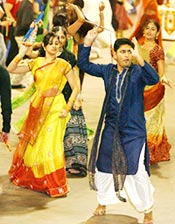It's a time to slip into your dancing shoes.
 "To me, Navratri means getting into my all night party mode. I do not miss a single night. At the end of it all, I am totally fatigued. I feel like a zombie and my legs turn to jelly. Well, to get something, you have to give up something, right?" asks Aanya Gupta, a 24-year-old computer engineer.
"To me, Navratri means getting into my all night party mode. I do not miss a single night. At the end of it all, I am totally fatigued. I feel like a zombie and my legs turn to jelly. Well, to get something, you have to give up something, right?" asks Aanya Gupta, a 24-year-old computer engineer.
Not really. Here are a few tips that will let you have your cake and eat it too.
i. Get some R & R (rest and recreation)
This applies both during and after the Navratri season.
Your body needs an average of seven to eight hours of sleep every night. Sleep deprivation can lead to health issues such as lack of concentration, inability to communicate effectively, headaches, vomiting bouts and even short-term depression.
During the season, try to leave the party a little early and catch up on your sleep, at least every third night.
Post Navratri, make sure you compensate for all those hours of missed sleep. Get at least nine to 10 hours of sleep every day for a week.
ii. Eat healthy
Have a light dinner an hour or two before you hit the dance floor. Allow three to four hours for a large meal to digest. Avoid eating fatty food for dinner.
Cut down on junk food and simple sugars. This also means saying no to those yummy sweets that are an integral part of this festival.
Drink lots of water. Buttermilk is a hydrating, low-calorie drink. Yogurt, too, is a good option.
iii. To snack or not to snack
Stock up on snacks you can munch on to keep your energy levels up on the dance floor. When those hunger pangs strike, you can choose from:
Breakfast bars: A good source of energy, folate and fibre.
Dried fruits: For their calcium, vitamins and iron.
Bananas: Rich in potassium.
Citrus fruit, strawberries: Rich sources of Vitamin C and folate.
Nuts: For their unsaturated (read 'good') fat and vitamins.
Low fat cheese: A good source of calcium and protein.
iv. What to wear
Avoid very heavy ghagra-cholis and too much jewellery. They can weigh you down and hasten fatigue.
Opt for light clothes, preferably cotton, that lets your skin breathe and keeps you relatively cool. Don't cover your head as this might cause overheating.
v. Frequent rest periods
Prolonged dancing can lead to dehydration and even heat stroke.
Take regular breaks and give your body the rest it needs badly. These timeouts will help you last through the night.
vi. Water, water everywhere
When you are dehydrated (long periods of dancing can cause this), both your performance and endurance are affected. This could eventually lead to heat exhaustion and even heat stroke.
What to do:
~ Don't wait until you are thirsty
Make sure you drink more than enough to just quench your thirst.
~ Choose the right fluids
Plain cool water is the best and cheapest bet. Orange juice diluted 1:1 with water is another option. Colas and undiluted juices are too rich in carbohydrate, which can lead to stomach cramps, nausea and diarrhoea.
Tea, coffee and alcohol are diuretics (which means they result in your losing water) and dehydrate the body even more. Bring along foods that contain a lot of water, such as oranges, watermelon, apples and grapes.
~ How much water to drink?
You need to sip water before, during and after dancing. Drink a glass of water before you start dancing.
If you are dancing vigorously, you should drink at least half a cup of water every 15 minutes. Drink a cup or two before leaving the dance hall. Do not drink litres and litres of fluids all at one time as this might cause water intoxication (dilution of your body salts).
vii. Girl's night out
If you are menstruating, make sure you have enough sanitary pads to last you through the night. You can take an analgesic like Paracetamol or Ibuprofen for the aches.
viii. Tips to tackle the soreness
The party is over. But the soreness remains. This is the worst part, right? Prevent soreness and muscle injuries by warming up before you start dancing. Stretch intermittently and increase your tempo gradually.
If you still feel sore, an analgesic such as Ibuprofen can help.
So will a relaxing hot water soak or a massage.
DON'T MISS!
Dr Roopa Nishi Viswanathan has an MBBS from KEM Hospital, Mumbai, with a Masters in Nutrition from the University of Texas at Austin.





